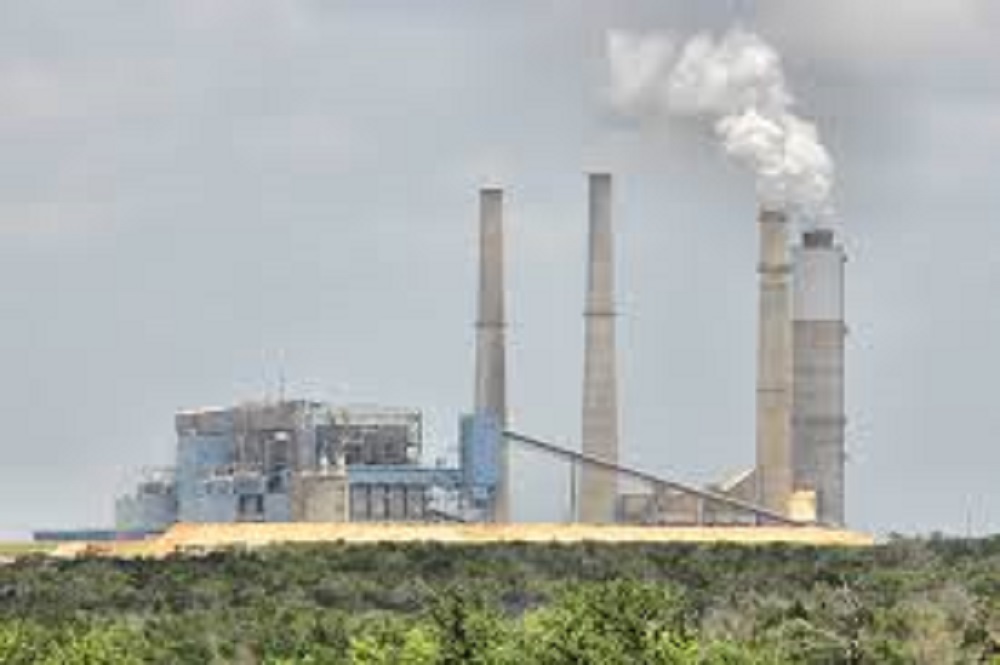Texas Can Lead a Green Revolution
In a congressional district where voters rely on fossil-fuel jobs, it’s not easy, but it's absolutely essential. The Fayette Power Project, a coal-fired power plant in Fayette County, Texas. (Larry D. Moore / CC BY-SA 3.0)
The Fayette Power Project, a coal-fired power plant in Fayette County, Texas. (Larry D. Moore / CC BY-SA 3.0)
My friend, Harvey Hayek, is a vintage Texan. A third-generation pecan farmer in Fayette County, he owns a gun club, hundreds of prime agricultural acres on the Colorado River and a bottomless store of homespun stories. Unfortunately, the most compelling of these relates to a coal plant that opened next door, 40 years ago, and destroyed Harvey’s livelihood—and nearly his life.
Harvey’s farm is a stone’s throw from the Fayette Power Project, a publicly owned coal-fired plant built in the late 1970s. When it opened, the city of Austin and the Lower Colorado River Authority—joint operators of the plant—promised it would be “clean” and would not hurt local life. Within years, however, the lie was proved, many times over.
Harvey’s pecan trees, which had sustained his family since the late 19th century and should have provided work and income for generations to come, slowly began to die. The plant’s emissions came back to earth as acid rain. Tree trunk samples tell the story: The rings turn black the year after the coal plant opened. What was once the most profitable pecan orchard in Texas became a place of desolation, producing no edible products.
Harvey himself developed health problems. Soon, he had difficulty walking and experienced bouts of temporary blindness. One day, after collapsing, he was taken to the hospital. An MRI revealed a massive tumor in his skull, what his doctor called the “third largest tumor in the United States.” The doctor surmised that toxic pollution was the likely cause.
https://twitter.com/SiegelForTexas/status/1176466311414788096
I’m running for Congress in a district that stretches east from north Austin, through seven rural counties, and concludes in the west Houston suburbs. When I speak to political “experts,” they tell me to stay away from environmental issues, because the district is an “oil patch” area, and too many people rely on fossil-fuel jobs.
And there is some truth to that: In Harris County suburbs like Katy, Cypress and Tomball, plenty of Democratic voters—and donors—work in fossil fuel-related industries. They are engineers and geologists, lawyers and human resource professionals. They make $100,000 a year or more working for Exxon, Schlumberger, BP and Halliburton. And certainly, when I address larger groups, they squirm a bit when I say the words “a Green New Deal.”
The science, of course, is indisputable. We must take dramatic action to reduce carbon emissions within the next few years. We must phase out extraction of fossil fuels; we must become a “net-zero” carbon producer by 2050. We must build an international coalition to combat climate change, to take immediate and substantial action. The price, if we do not, will be hundreds of millions of lives, and untold trillions of dollars in economic harm.
Still, the Green New Deal is inconvenient in a state that serves as the heartbeat of the national energy economy. The Texas 10th, the district I am running in, includes laborers who build pipelines, electrical workers who run coal plants, and thousands of individuals whose family incomes are tied, directly or indirectly, to the fossil-fuel economy.
But leadership requires holding uncomfortable conversations. And while the Texas 10th District incumbent, Republican Michael McCaul, may be comfortable taking hundreds of thousands of dollars from the fossil-fuel industry and soft-pedaling any government intervention, I don’t have that luxury. I’m running for Congress in a gerrymandered district against an incumbent worth $300 million. I only win if I galvanize a social movement, by speaking truth to power.
The Green New Deal provides a fantastic framework to provide a real alternative to the status quo.
First, we acknowledge the gravity of the climate crisis and demand immediate, massive governmental action to address it. We restructure the American economy and use the power of the Treasury to generate hundreds of thousands of jobs building a renewable economy.
Second, we guarantee a true “just transition” for fossil-fuel workers, who should not suffer when we adjust national policy to respond to the environmental crisis. This means much more than job training; we must guarantee income and health care, housing and retirement benefits, and we must provide as many comparable high-quality jobs as possible.
And third, we must remedy the legacy of environmental justice. That means clean-ups and reparations for the communities that have been on the front lines of environmental pollution.
And that means justice for Harvey, for his family and neighbors, for everyone who has suffered because of the Fayette Power Project.
Many people, even those of us who live an hour’s drive from the coal-fired plant, haven’t heard about the true costs of its operation. Through my campaign, I’ve met the neighbors. I’ve heard about a corridor of cancer cases near the “pond” in front of the plant. I’ve heard about early-onset Alzheimer’s, widespread asthma among youths and elevated lead levels in children. I’ve heard about dead livestock and wildlife. And dead pecan orchards.
An array of structural impediments have delayed justice for Fayette County. There is the state environmental commission—responsible for issuing air and water permits—appointed by a Republican governor who can receive unlimited fossil-fuel contributions. The river authority that owns two-thirds of the coal-fired plant is largely controlled by the same Republican governor. We have a municipal energy company in liberal Austin that for many years did not bother to inquire about the conditions of rural neighbors to the east. And we’ve had a delayed national conversation about the real consequences of coal power and the fossil-fuel economy.
But now, in 2019, we have an opportunity. A new wave of progressivism has inspired such visionary policies as the Green New Deal, and has created a pathway for candidates like me to walk. We have an invigorated labor movement, including unions in Austin and across Texas that want a seat at the table as we confront climate change and develop a national jobs and infrastructure program. And we have a Republican administration, at both the state and federal levels, that is so callous, so corrupt and so indiscriminate in its advocacy for fossil-fuel interests that even local independent and libertarian voters are looking for alternatives, in order to protect their lives and livelihoods.
Which brings me back to the Fayette Power Project. The original New Deal had a project in every congressional district. In 2021, when we enact the Green New Deal, let’s make transitioning this coal-fired plant the project for the Texas 10th District. We can create reduce carbon emissions, create new jobs and remedy the legacy of pollution for this region.
And in the process, Texas can show the nation what a sustainable future looks like.
Your support is crucial...As we navigate an uncertain 2025, with a new administration questioning press freedoms, the risks are clear: our ability to report freely is under threat.
Your tax-deductible donation enables us to dig deeper, delivering fearless investigative reporting and analysis that exposes the reality beneath the headlines — without compromise.
Now is the time to take action. Stand with our courageous journalists. Donate today to protect a free press, uphold democracy and uncover the stories that need to be told.





You need to be a supporter to comment.
There are currently no responses to this article.
Be the first to respond.